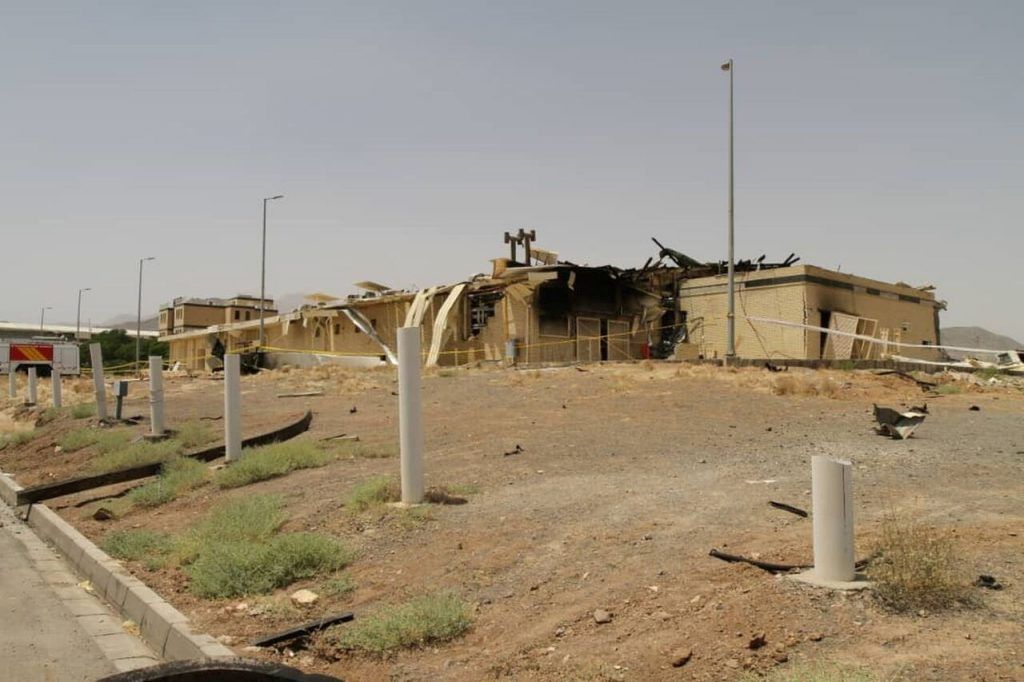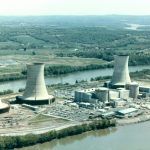Explosion at Natanz: Why sabotaging Iran’s nuclear program could backfire
By Mahsa Rouhi | July 15, 2020
 This photo, released by Iran’s Atomic Energy Organization shortly following the explosion, shows the least damaged side of the building. Image Credit: AEOI News.
This photo, released by Iran’s Atomic Energy Organization shortly following the explosion, shows the least damaged side of the building. Image Credit: AEOI News.
An explosion and fire at a workshop at Iran’s Natanz nuclear facility on July 2, which destroyed the better part of an entire building, was followed by a flurry of speculation about the cause. Perhaps a domestic dissident group had planted a bomb, a foreign government had conducted a cyberattack, or an underground gas pipeline simply exploded by accident. Iran’s Atomic Energy Organization announced on July 5 that it had determined the cause, but was withholding that information because of “security considerations.” Still, there is mounting circumstantial evidence that Israel and the United States were involved in what was a deliberate act of sabotage.
There is also a growing debate about the larger impact on Iran’s nuclear program. Iranian officials estimate that the incident had delayed advanced centrifuge production by several months. Outside experts have gone further, claiming a setback of one or two years. If the United States or Israel did have a hand in the accident, top CIA and Mossad officials might be reveling in their success. But would such an operation be worth it, given Iran’s likely response?
The answer is no. Sabotage is not a long-term solution for the political problem posed by Iran’s nuclear program. To the contrary, a fuller consideration of Tehran’s calculus, including Iran’s domestic political debate, reveals that covert operations will only undermine long-term nonproliferation efforts. Hardline voices in Tehran will become more motivated to rapidly advance Iran’s nuclear program and will be emboldened in their push to limit cooperation with the International Atomic Energy Agency (IAEA) on inspections.
Background on the facility. The nuclear deal between Iran and world powers placed a series of restraints on Iran’s nuclear program, including an eight-year limit on Iran’s ability to manufacture advanced centrifuges. Iran started constructing a workshop at Natanz in 2012, for the express purpose of assembling advanced centrifuges; after 2015, when the deal was signed, Iran decided to keep the facility shuttered, in line with its commitments.
In May 2018, President Trump announced the US withdrawal from the nuclear agreement. Ayatollah Khamenei responded by mandating that Iran’s Atomic Energy Organization prepare to drastically increase its uranium enrichment capacity “without delay.” Two days later, Iran opened the workshop.
Experts at the Institute of Science and International Security assess that the building—now in ruins—was Iran’s only facility that could accommodate mass assembly of advanced centrifuges, and that it could have produced several thousand per year. They concluded that replacing the building would take “at least a year, if not longer.”
This wouldn’t be the first time that Natanz, Iran’s primary enrichment facility and a key component of its nuclear program, was targeted by a foreign government. Natanz was also the site of a wave of cyberattacks that began with the Stuxnet virus, first discovered in 2010. Interestingly, initial estimates suggested that Stuxnet set back Iran’s nuclear program by three to five years, but later analyses concluded that it may have had no significant impact whatsoever.
Domestic debate in Iran. Since the US withdrawal from the nuclear deal, Iran has taken a series of gradual steps to exceed the deal’s enrichment limits. Many of these steps could be easily reversed should the US return to the deal, or the remaining parties find a way to compensate Iran for the benefits the US has withdrawn. President Hassan Rouhani has maintained that remaining within the legal framework of the agreement is in Iran’s best interests. If the nuclear deal is still in place, his thinking goes, then Iran can continue to argue that the US maximum pressure campaign has failed. It can also use the deal as the starting point for future nuclear negotiations, and any further concession that it offers in such negotiations would not be viewed as the result of capitulation to US pressure.
However, with a tormented economy and Iran seemingly under attack, Rouhani’s argument has grown less convincing to his domestic opponents. The prospect of all parties returning to full compliance under the nuclear agreement has become less likely, and anti–nuclear deal rhetoric in Iran is only growing. Hardline factions that have challenged the Rouhani administration’s approach since the start of the deal now have the upper hand in the debate and have already begun to push back on IAEA inspections.
In the aftermath of the Natanz incident, hardliners’ reluctance to cooperate will appear more justified. Just a few days after the explosion, a member of the Iranian parliament’s national security commission claimed that the incident was a result of “infiltration” and “espionage” on the part of IAEA inspectors. Those who argue seriously for withdrawing from the Nuclear Non-Proliferation Treaty will claim that halting cooperation with the IAEA altogether would make future sabotage less likely. If the country is going to endure economic pressure and isolation regardless, it might as well enjoy the inspections immunity that comes with it. Some in Iran also point to the impunity that North Korea enjoys and argue that these sabotage attacks only happen to countries without a nuclear weapons capability.
The long-term. As Rouhani navigates the growing political pressure, Iran has made clear it is committed to overcoming any setback in order to maintain and expand its nuclear program. The spokesman for Iran’s Atomic Energy Organization, Behrouz Kamalvandi, has already said that “a larger shed with the most modern equipment will be constructed.” He added that Iran would make up for the delays caused by the fire “through round-the-clock work.”
The political debate about the Natanz incident highlights the argument that in face of attacks on its nuclear sites, Iran will not scale back its nuclear policy plans. On the contrary, it will expand and accelerate its activities, potentially more provocatively. As Tehran sets out to rebuild these sites bigger and better than they were before, it is also likely to increasingly rely on building underground facilities for its most sensitive production, to avoid exposing itself to attacks.
Sabotage attacks can at best delay—but not halt—Iran’s nuclear program. Worse, they could tip the political balance in favor of going for broke. The US intelligence community judges that whether or not Iran acquires a nuclear weapon is a matter of political will. If anything, it would seem Iran’s will is growing.
Natanz is a declared site that is subject to frequent IAEA inspections. The destruction of the advanced centrifuge assembly workshop may tarnish Iran’s trust for inspections and push it to harden its sensitive sites or advance its nuclear program covertly. Acts of sabotage jeopardize transparency—and the prospect of keeping the nuclear deal alive and improving upon it in any future nuclear agreement. Seeking short-term tactical gains that undermine trust and hinder the long-term strategic goal of containing Iran’s nuclear program is dangerous and shortsighted. Diplomacy is the best sustainable and effective means of reaching a solution.
Together, we make the world safer.
The Bulletin elevates expert voices above the noise. But as an independent nonprofit organization, our operations depend on the support of readers like you. Help us continue to deliver quality journalism that holds leaders accountable. Your support of our work at any level is important. In return, we promise our coverage will be understandable, influential, vigilant, solution-oriented, and fair-minded. Together we can make a difference.
Keywords: IAEA, Iran, Iran nuclear deal, JCPOA, sabotage
Topics: Nuclear Risk
















The 2015 Nuclear agreement only limits the use of centrifuges at Natantz until 2026
By 2031 enrichment caps are cancelled and Iran can enrich as much as she likes. Thats not a nuclear agreement its a short delay to progress.
Saving a few years is not worth the damage that an invigorated Iranian economy can do to the surrounding countries of Lebanon, Irag and Syria where Iranian money finances terrorism and violent sectarianism.
Better to sanction the Iranian economy and degrade their nuclear capabilities through all means until more sensible leaders run that country.
No, after those limits are lifted, Iran will be subject to an inspections regime that is more strict than what other NPT members are subject to. When Trump argues that Iran is free to race to build the bomb, he is making propaganda, that would be wring even if all restrictions would have expired, because even under just the NPT Iran would not be allowed to do that and there would be inspections to monitor what Iran would be doing. But Iran would not only be subject to more inspections, it would also be subject to restrictions that would limit… Read more »
Iran did nothing wrong, The Nuclear Program is peaceful not for weapons
It doesn’t seem plausible to me that Iran would retaliate by building nuclear weapons. Iran has made the decision to not do this, that decision is based on a pragmatic evaluation of the benefits of going nuclear. Iran has concluded that on balance there is no benefit to build nuclear weapons. This calculus is not going to change due to the attacks. What is possible is that Iran is going to aim for another sort of deterrence. It may then exploit our fear of the possibility of Iranian nuclear weapons to take provocative measures on the nuclear front. But this… Read more »